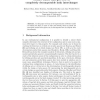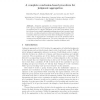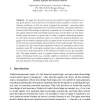3172 search results - page 4 / 635 » On the Random-Self-Reducibility of Complete Sets |
IJCM
2002
13 years 9 months ago
2002
In this paper we focus on the representation of Steiner trades of volume less than or equal to nine and identify those for which the associated partial latin square can be decompos...
TCC
2009
Springer
14 years 10 months ago
2009
Springer
Gordon et al. recently showed that certain (non-trivial) functions can be computed with complete fairness in the two-party setting. Motivated by their results, we initiate a study...
ALDT
2009
Springer
14 years 4 months ago
2009
Springer
Judgment aggregation is a formal theory reasoning about how a group of agents can aggregate individual judgments on connected propositions into a collective judgment on the same pr...
CC
2005
Springer
14 years 3 months ago
2005
Springer
We introduce a new approach, called completeness analysis, to computing points-to sets for incomplete Java programs such as library modules or applications in the presence of dynam...
DALT
2005
Springer
14 years 3 months ago
2005
Springer
An agent who bases his actions upon explicit logical formulae has at any given point in time a finite set of formulae he has computed. Closure or consistency conditions on this se...



